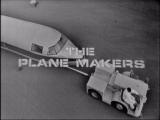
14 October 1963
Don't Stick Your Head Out. Writer Peter Draper . Director Quentin Lawrence.
"In big business, if you stick your head out too far, there’s always someone taking aim at it – with an axe! “ John Wilder.

This is a significant episode, for three reasons. It is the first script about John Wilder by Peter Draper who would make a significant contribution to both this series and The Power Game. The episode also introduces Jack Watling as sales manager Don Henderson. But the most significant aspect of this episode is that it opens up a controversial aspect of Wilder’s life.
It would be interesting to know if this was originally intended to be Jack Watling’s first appearance in the show, or if Henderson had been intended to appear from the start and been delayed in some way. This doesn't feel like an introductory episode for Henderson. He only has a couple of scenes, but is treated as an established member of the team. In fact, the initial mystery is why John Wilder decides to take Arthur Sugden on a sales trip to Italy, rather than his sales manager. Sugden himself is dubious about his role on the trip. Although he’s drawn by Wilder into the technical aspects of the sales pitch, Sugden later tells Wilder that, “An apprentice could have handled the question.”
The bombshell, certainly for 1963, is that Wilder takes his mistress on the sales trip. Wilder’s secretary Kay Lingard (Norma Ronald) has arranged three air tickets for the trip, and Sugden assumes Lingard will be coming until Wilder brazenly arrives at the airport with Kate Barber(Ingrid Hafner ) telling Sugden that “Miss Barber will be acting as my Secretary.”
Hafner, who played Ian Hendry’s receptionist Carol in the first series of “The Avengers”, portrays Kate Barber as similar in many ways to Pamela Wilder. Earlier in the episode, Wilder has arranged events so that Pamela can’t accompany him on the trip. Pamela (Barbara Murray) makes it plain she can sense his guilt and says, “You only have to tell me. You don’t have to go through this elaborate pantomime so I won’t go with you.”

Kate is equally resigned, telling Sugden that she had a daughter to support after her husband left her for a 17 year old girl. “I can do shorthand, but not very well. Parents should bring up children to assume no-one will take care of them. Mine didn’t.” She describes the relationship with Wilder as being, “Very like marriage. Marriage becomes a series of habits. So does this, except the habits are further apart. Once a year we go to the South of France. Theatre four or five times a year. Nightclubs – never anywhere too fashionable…I suppose some wives don’t get that.”
Wilder himself has a sense that things are cooling off. “When a woman has had a long, continuous relationship with a man, his more romantic image is bound to diminish. Just as no man is a hero to his valet – or his mistress.”
Patrick Wymark later told the Catholic Herald (2nd December 1966)that, “My dear old mother, who is 83, rang me up and said she didn't like the idea that Wilder had a mistress. She didn't like it because she is a very staunch Catholic and this was for her a matter of morals. So I asked her if she would mind watching me play Macbeth, killing kings, murdering children? “

Arthur Sugden (Reginald Marsh), John Wilder (Patrick Wymark) and Kate Barber (Ingrid Hafner) discuss art.
The episode sets the standard for Draper's later scripts with entertaining interplay between the three characters. In an early scene, Wilder joins Kate and Sugden at the hotel bar. “I’ve been telling Mr Sugden that if he’s in Milan long enough he ought to try and see the paintings in the Museo Poldi Pezzoli.”
Wilder smiles with mild sarcasm. “I expect you’ll be dashing off first thing in the morning, Arthur”
“You never know,” Sugden grunts, “I might have hidden depths.”
Draper's script gives the basis for three strong performances: Ingrid Hafner as the charming, dignified and pragmatic Kate Barber, Wymark showing a more vulnerable side of Wilder and Reginald Marsh portraying the competent but bewildered Sugden.
The root of the story is the mystery as to why Wilder has taken Sugden on the sales trip. The answer may have seemed a bit of a head-scratcher at the time since Wilder and Sugden debate some financial detail which is hard to take in. The paternalistic owner of the Italian company is dying, and that makes the company too risky as a customer. Wilder puts it in poetic terms, “You and I have been officiating at the death of an Empire. We came out specifically not to sell an aeroplane. It’s very difficult to stop a salesman selling, so it’s best not to put it in their hands.”
In the end, the scrupulous Sugden finds himself compromising, both on moral and business grounds. Wilder comforts him with the words, “Everybody’s soul is just a bit smaller than the mortgage on his house.”
Caparo, head of the Italian airline, is played by Newton Blick who was a long established stage performer ( The end credits say that Newton Blick “appears by permission of the Governors of the Royal Shakespeare Theatre” whereas Patrick Wymark had received an end credit in “A Question of Sources” as appearing “by permission of the Governors of the Royal Shakespeare Company”).